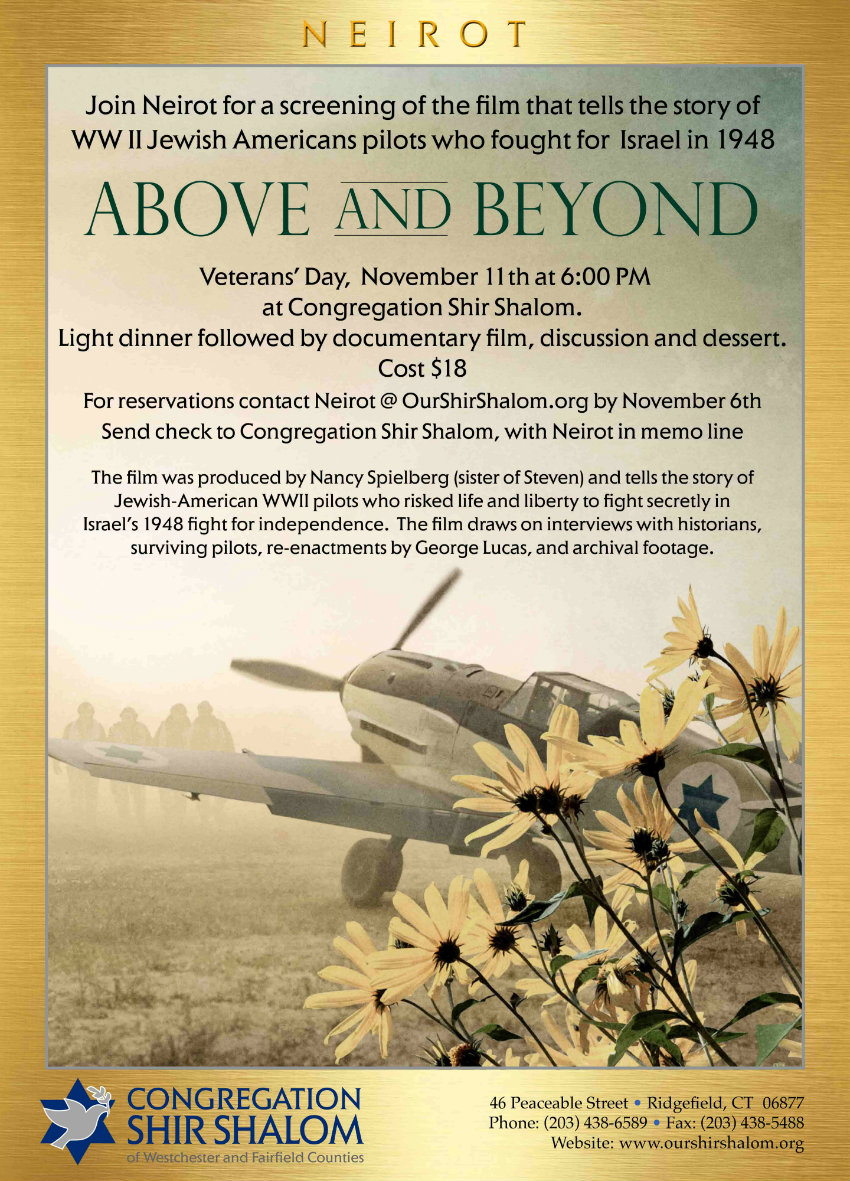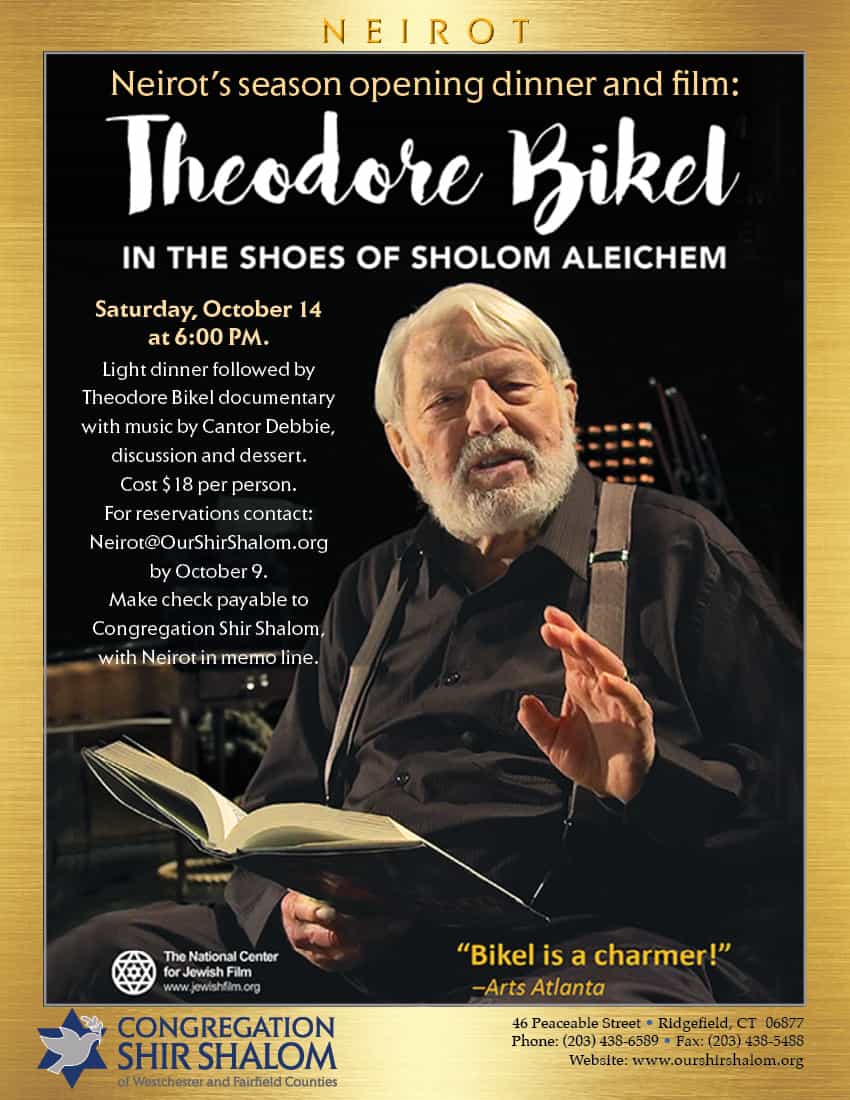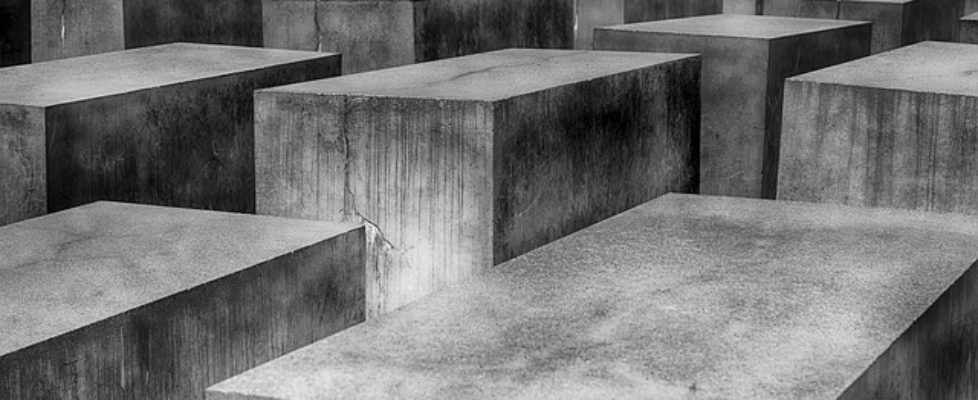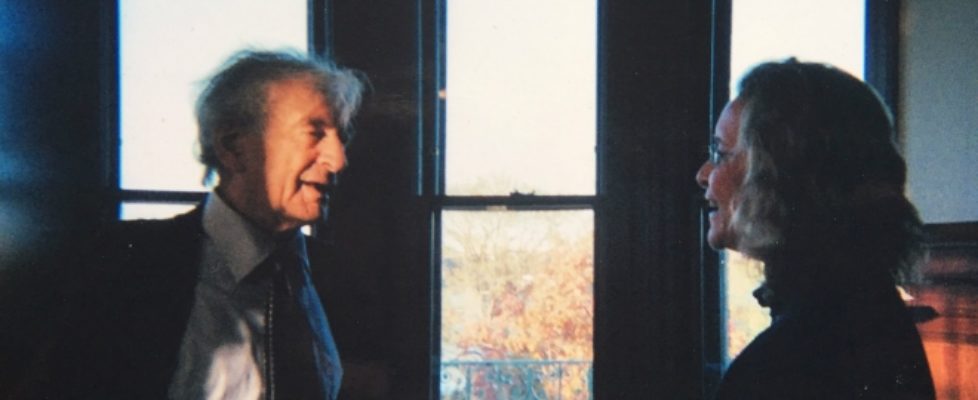HHD Sermons
Here are the texts of Rabbi Reiner’s sermons (click to open)
Hineni, Mah L’Cha Po—Behold Why We Are Here – Erev Rosh Hashanah

Here are the texts of Rabbi Reiner’s sermons (click to open)
Hineni, Mah L’Cha Po—Behold Why We Are Here – Erev Rosh Hashanah

Light dinner followed by documentary film, discussion and dessert.
Cost $18
For reservations contact Neirot @ OurShirShalom.org by November 6th
Send check to Congregation Shir Shalom, with Neirot in memo line
The film was produced by Nancy Spielberg (sister of Steven) and tells the story of Jewish-American WWII pilots who risked life and liberty to fight secretly in Israel’s 1948 fight for independence. The film draws on interviews with historians, surviving pilots, re-enactments by George Lucas, and archival footage.


Join us for a light dinner followed by a Theodore Bikel documentary with music provided by Cantor Debbie.
A discussion and dessert will follow.
$18 per person, please RSVP to Neirot@OurShirShalom.org by October 9, 2017
Make check payable to Congregation Shir Shalom, 46 Peaceable Street, Ridgefield, Ct. 06877


by Cantor Deborah Katchko-Gray
There are more questions than answers. Perhaps there are no good answers anyway, but we must ask the questions to remain human. Elie Wiesel of blessed memory was the teacher of teachers, our modern day prophet who dared ask questions and dared to admit there are no good answers. His answer was to remember- remember the victims, remember the history of the victims and yet, reject despair and continue to hope.
Prof. Avinoam Patt, of the University of Hartford presented an excellent workshop at the Museum of Jewish Heritage last November. He acknowledged “the enormous challenge of teaching the Holocaust, and the sacred burden of memory.” He focused on literature, diaries, memoirs and fiction to help students develop empathy. The Diary of Chaim Kaplan shared fears, rumors, and the struggle of daily life. In l940, he thought this is the worst it could get- having no idea what was lying ahead in the concentration camps. In the face of life and death, remarkably the ghetto library still celebrated the loan of the 100,000th book. In A Diary in the Vilna Ghetto, Hermann Kruk shared, “ Today there was a celebration in the ghetto- the loan of the 100,00th book from the ghetto library…reading books in the ghetto is the biggest treat there is. Books link us to freedom; books connect us to the world.” If you want to understand Jewish values, it is right here- study, intellectual growth, and moral values. Prof. Wiesel taught us that having advanced degrees like the Nazi leadership was useless without moral and ethical education.
I remember a class with Prof. Elie Wiesel when he described the sheer joy and privilege of holding a prayer book. It shook me to my core- really? How many times have I held a prayer book, and how many times did I feel it was a privilege? This was the first time I understood the power of prayer- imagine being in a concentration camp and the mere act of owning a prayer book would be met with instant death.
Elie Wiesel described the power of holding a prayer book in your hands. The connection to our ancestor’s prayers, our prayers, our connection to G-d and the hope and strength we can get from that connection.
Reading and studying the diaries of the Holocaust can bring us closer to the hearts and souls that were lost. Those brave enough to defy the Nazis and write down the daily atrocities for future generations. Risking one’s life to write something you’re not even sure will survive you. The least we can do is read them and remember.
Primo Levi wrote, “ If This Is a Man”…I commend these words to you- carve them in your hearts…”
Elie Wiesel wrote in “ Night”, “ … never shall I forget those moments that murdered my G-d and my soul and turned my dreams to ashes. Never shall I forget those things, even were I condemned to live as long as G-d Himself. Never.”
This article was first published on Forward

Wilton resident Stephen Hudspeth submitted this letter to The Ridgefield Press and its sister paper, The Wilton Bulletin, after a service he attended at Ridgefield’s Reform Jewish Congregation Shir Shalom on Friday evening January 13, 2017.
There are some experiences that fit the times we live in perfectly. One such occurred this past Friday at the main evening service at Reform Jewish Congregation Shir Shalom on Peaceable Street.
In some respects, it was a continuation of a fourteen-year tradition for observance of the weekend devoted to the memory of the Rev. Dr. Martin Luther King, Jr. Each of those years on the Friday of that weekend, the Congregation’s musical director Cantor Deborah Katchko-Gray has invited the Serendipity Chorale of Southwestern Connecticut – regularly augmented by members of the Ridgefield Chorale and the Ridgefield Congregational Church’s choir — to join the Congregation’s own singers and other musicians in a program that blends Jewish Shabbat-observance music with Spirituals and Gospel-style praise music in a joyous and uplifting service that honors the differences in both traditions while it also underscores their striking similarities. The Serendipity Chorale celebrated its 40th anniversary this past year and is directed by the cantor’s very good friend Gigi Van Dyke.
For both Jews and African-Americans, the experience of slavery has been a seminal part of community life and heritage, and for both, the cry of freedom and struggle for justice resonates strongly. And it is surely the case that the powerful and transformative speeches of Dr. King as well as the lyrics of many soul-stirring Spirituals echo with the words of the Hebrew Bible: “Let freedom roll down like a river, and righteousness like a mighty stream”; “Go down, Moses, way down to Egypt land; tell old Pharaoh to let my people go!”; “Didn’t my Lord delivery Daniel, then why not every man?!”
And in the Shabbat music lexicon of Shir Shalom, whose very name is translated “Song of Peace”, are a host of deeply moving pieces both ancient and as modern as the 21st Century that, just like Spirituals, can encourage clapping and dancing as well as deep reflection. Cantor Deborah Katchko-Gray comes from one of the world’s most distinguished cantorial families, and her knowledge of, and facility in, a huge repertoire flows directly from that proud tradition. Likewise, Director Van Dyke’s familiarity with the vast Spiritual and Gospel repertoire is legendary in this area, and the combination of the two and their choirs and instrumentalists assures a remarkable experience each year.
This year especially, the importance of coming together has been underscored by the deep fissures that this past national election revealed and exacerbated. After a warm and joyous welcome to all, Shir Shalom’s Rabbi David Reiner candidly and courageously addressed those issues in his sermon, underscoring the importance of finding common ground, engaging in reconciliation, and restoring a sense of community.
He referenced the principles recently enunciated by the leadership of his Congregation in four guiding precepts that include embracing “the opportunities democracy provides and the responsibilities it requires”; cherishing “the diversity [that is] an essential component of our community and our country” and “stand[ing] side-by-side with those who share those values”; rejecting “hate, discrimination, and bias in any and all forms, language that divides, discriminates, or demeans, and behavior that incites hatred or promotes fear”; and finally, pledging “to oppose bigotry, bias, bullying of all kinds and at all turns, to provide comfort, support, and strength for those who fear or face such bias, and to be vigilant to protect these values.”
That is a remarkable statement. And the responsive readings compiled by Rabbi Reiner from multiple sources that formed a powerful part of the liturgy for this service included this striking sentence: “Hate cannot drive out hate; only love can do that.”
So his sermon’s message was one of peace and reconciliation but also of challenge: to be our best as we do our best, as we listen to one another with respect and openness, and as we model the Congregation’s four guiding precepts in our own lives.
That is a message that would have resonated strongly with Dr. King, and he would undoubtedly conclude — as Rabbi Reiner himself did, quoting Dr. King — with a vision for a future in which formerly bitterly divided people (“the sons of former slaves and the sons of former slaveowners”) “will be able to sit down together at the table of brotherhood.” That is a result we all need to accomplish across political divides, racial differences, ethnic and national-origin differences, and all of those amazingly diverse attributes of America that are, and have always been, its great strength. This service offered a huge and much-needed beacon of light pointing in that direction.
Thursday, October 13, 2016 ~ 11 Tishrei 5777
Dear Friends,
It saddens me deeply to share that Rabbi Marcus Burstein died peacefully at home on Wednesday evening following the conclusion of Yom Kippur. Rabbi Burstein was a dear friend and colleague and a very special person. His indefatigable commitment to Judaism and the success of our congregation, especially during the past year, is inspiring. I miss him and know that many of you will be greatly saddened by this news.
Our collective thoughts, condolences, and prayers go out to Rabbi Burstein’s family, his husband Eric Larson, and their children Sarah, Stephen, and Sandra; his parents, Arlene and Julian, as well as his siblings, Adam, Maura, and Seth, and all his extended family.
The funeral for Rabbi Burstein will be Friday, October 14 at 10:30AM at Greenburgh Hebrew Center (515 Broadway, Dobbs Ferry, NY 10522), followed by interment at Baron Hirsch Cemetery (1126 Richmond Avenue, Staten Island, NY 10314).
Friends and members of our congregation can extend condolences to Rabbi Burstein’s family in their observance of shiva:
– Saturday, October 15, 2016 at Temple Emanu-El (756 East Broad Street, Westfield, NJ 07090) from 7-9 with a service at 7:15
– Sunday, October 16, 2016, at Greenburgh Hebrew Center (515 Broadway, Dobbs Ferry, NY 10522), from 2-4PM with a service at 2:30
– Monday, October 17, 2016 at Congregation Shir Shalom (46 Peaceable Street, Ridgefield, CT 06877) from 7-9PM with a service at 7:30. While the Festival of Sukkot traditionally annuls observance of shiva, we will gather for a special service to comfort each other and Rabbi Burstein’s family.
– Tuesday, October 18 at the home of Arlene Burstein (440 Westgate Drive, Edison, NJ 08820) from 7-9PM
– Wednesday, October 19, at the home of Arlene Burstein, from 2-4and 7-9PM
In addition to these opportunities to comfort Rabbi Burstein’s immediate family, please consider joining us for worship at Congregation Shir Shalom in the days ahead, to recite teh Mourner’s Kaddish and gather with and comfort each other as members of our congregational family:
-Friday, October 14, 2016; Shabbat Evening Worship at 7:30PM
-Saturday, October 15, 2016; Shabbat Morning Worship at 10:30AM
-Sunday, October 16, 2016; Sukkot Evening Worship at 6PM
-Monday, October 17, 2016; Sukkot Morning Worship at 10AM
Donations honoring Rabbi Burstein’s memory can be made to:
Hebrew Union College – Jewish Institute of Religion (click here)
or by check:
Rabbi Marcus L. Burstein L’Dor V’Dor Fund
HUC-JIR, Brookdale Center
One West Fourth Street
New York, NY 10012
Religious Action Center of Reform Judaism (click here)
(Include “Rabbi Marcus Burstein” in the “In memory of” section)
or by check:
Religious Action Center of Reform Judaism
2027 Massachusetts Ave NW
Washington, D.C. 20036
Rabbi Burstein and I also discussed that contributions to Congregation Shir Shalom in his memory will be used to create a Scholar-In-Residence Fund and support one of his passions, adult education.
Letters and condolence cards can be sent to the Congregation Shir Shalom office and will be forwarded to Rabbi Burstein’s family.
While our office will be closed Friday so our staff can attend the funeral and Monday for the Festival of Sukkot, please stop by Congregation Shir Shalom for a hug or a cup of coffee today or in the days ahead, to share your stories about Rabbi Burstein and his impact on your life. We will have a book in the library where you can leave notes or memories of Rabbi Burstein.
Recognizing that Rabbi Burstein was like a family member for many in our congregation, may we all find comfort and consolation as we gather to mourn, amongst the mourner of Zion!
With warm wishes,
Rabbi David L. Reiner
Hal Wolkin, co-president
Gale Berman, co-president

Prof. Wiesel taught us that to be Jewish was not only a miracle but a holy responsibility to remember and continue.
http://forward.com/scribe/346614/how-elie-wiesel-taught-me-to-sing-the-miracle-of-jewish-survival/
Positive Discipline
November 20, 2017 by urjnetworkadmin • RS Blog Tags: Religious School •